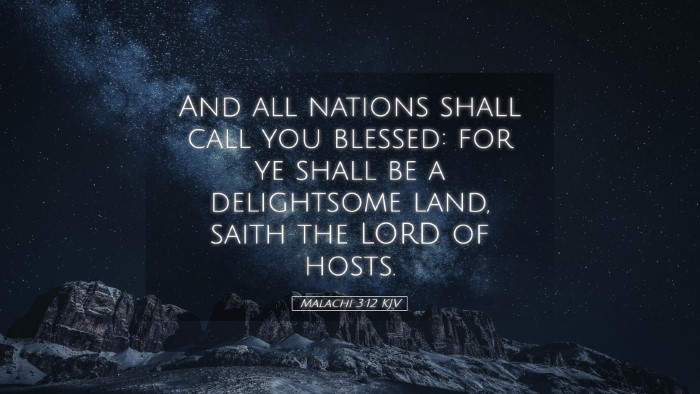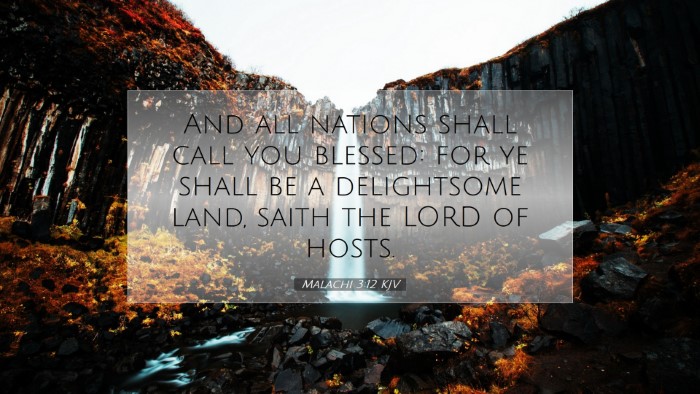Old Testament
Genesis Exodus Leviticus Numbers Deuteronomy Joshua Judges Ruth 1 Samuel 2 Samuel 1 Kings 2 Kings 1 Chronicles 2 Chronicles Ezra Nehemiah Esther Job Psalms Proverbs Ecclesiastes Song of Solomon Isaiah Jeremiah Lamentations Ezekiel Daniel Hosea Joel Amos Obadiah Jonah Micah Nahum Habakkuk Zephaniah Haggai Zechariah MalachiMalachi 3:12
Malachi 3:12 KJV
And all nations shall call you blessed: for ye shall be a delightsome land, saith the LORD of hosts.
Malachi 3:12 Bible Commentary
Commentary on Malachi 3:12
Verse: "And all nations shall call you blessed: for ye shall be a delightsome land, saith the LORD of hosts."
Introduction
This verse from Malachi is pivotal in understanding God's promise to Israel regarding the consequences of their faithfulness and obedience. Throughout history, commentaries have explored the nuances and theological implications of this text, providing depth for pastors, theologians, and scholars alike.
Contextual Background
Malachi, the last book of the Old Testament, addresses the people of Israel after their return from Babylonian exile. The Israelites were struggling to maintain their covenantal relationship with God, often exhibiting doubt and a lack of commitment to the principles laid out in the Law. In this context, Malachi serves as both a warning and an encouragement, emphasizing the importance of honoring God through tithes and offerings.
Theological Themes
- Divine Blessings: The promise that "all nations shall call you blessed" reflects God’s intention to make Israel a testimony of His goodness. According to Matthew Henry, this blessing signifies not only material prosperity but also spiritual fulfillment.
- God’s Faithfulness: The phrase "saith the LORD of hosts" underscores God's sovereignty and commitment to His covenant. Adam Clarke notes that God’s ownership of the land and its inhabitants is an assurance that obedience will result in divine favor.
- Witness to the Nations: The text implies that through Israel’s obedience, the surrounding nations would recognize the truth of God’s provision and power. Albert Barnes emphasizes this as a call to God's people to live in a manner that attracts others to Him.
Commentary Insights
Matthew Henry
Matthew Henry observes that the blessings promised in this verse are not limited to physical abundance but extend to a deeper spiritual joy and fulfillment. He highlights the concept that the "delightsome land" represents a state where God's presence is fully recognized and appreciated. Henry further asserts that this blessing becomes a part of the identity of God's people, marking them as distinct and honored among the nations.
Albert Barnes
Albert Barnes focuses on the implications of being called "blessed" by other nations. He interprets this as a prophetic declaration about the future mindset of Gentiles towards Israel. Barnes points out that the specific mention of nations reflects the universality of God’s grace and the eventual acknowledgment of His kingdom beyond Israel. He stresses the importance of obedience in accessing these divine declarations, suggesting that Israel’s return to faithfulness is crucial for their witness to the world.
Adam Clarke
Adam Clarke emphasizes the conditional nature of the promises made in Malachi. He argues that the blessings of verse 12 come as a result of adherence to God’s laws, specifically in terms of tithes and offerings. Clarke notes that to be called "blessed" by other nations is both an honor and a responsibility, as it places the onus on Israel to exemplify the character of God. He also points to historical contexts where Israel’s disobedience resulted in a tarnished reputation among neighboring peoples, making their faithfulness essential to fulfilling God's promises.
Application for Today
For modern readers, this verse compels a reflection on how faithfulness to God can shape personal, communal, and even national identities. The significance of tithes and offerings extends beyond monetary value; it is an act of worship and acknowledgment of God’s sovereignty over all aspects of life. The call to be a "delightsome land" can inspire congregations to seek ways to reflect God's blessings in their communities and engage actively in missional living.
Conclusion
In conclusion, Malachi 3:12 serves as a rich source of theological reflection on the nature of God’s promises and the expectations He places on His people. It encourages not just the people of Israel but all believers to recognize their role as witnesses to the nations, calling them to experience the blessings of a relationship with the Lord. This commentary, rooted in the insights of Matthew Henry, Albert Barnes, and Adam Clarke, thus offers a profound understanding relevant for contemporary faith practice.


